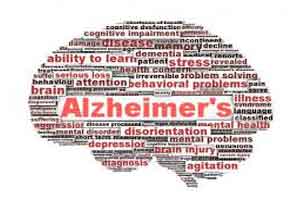- Home
- Editorial
- News
- Practice Guidelines
- Anesthesiology Guidelines
- Cancer Guidelines
- Cardiac Sciences Guidelines
- Critical Care Guidelines
- Dentistry Guidelines
- Dermatology Guidelines
- Diabetes and Endo Guidelines
- Diagnostics Guidelines
- ENT Guidelines
- Featured Practice Guidelines
- Gastroenterology Guidelines
- Geriatrics Guidelines
- Medicine Guidelines
- Nephrology Guidelines
- Neurosciences Guidelines
- Obs and Gynae Guidelines
- Ophthalmology Guidelines
- Orthopaedics Guidelines
- Paediatrics Guidelines
- Psychiatry Guidelines
- Pulmonology Guidelines
- Radiology Guidelines
- Surgery Guidelines
- Urology Guidelines
Cerebrospinal fluid may help with early detection of Alzheimer's disease

Little is known about the role of the brain's immune system in Alzheimer's disease. Researchers at the Munich site of the German Center for Neurodegenerative Diseases (DZNE) and the hospital of the Ludwig Maximilian University (LMU) Munich have now found an early immune response in individuals with a genetic predisposition to Alzheimer's: their brain's showed abnormal immune reactions as early as about seven years before the expected onset of dementia. These results demonstrate that in cases of Alzheimer's, inflammatory processes in the brain evolve dynamically and are precursors of dementia. These immune responses can be detected by means of a protein in the cerebrospinal fluid, offering physicians the possibility to trace the progression of the disease. The study results are published in the journal Science Translational Medicine.
The scientists headed by Prof. Christian Haass and Prof. Michael Ewers were able to detect an increasing immune activity of the brain by measuring levels of the protein "TREM2" in the cerebrospinal fluid. TREM2 is segregated by certain immune cells of the brain -- called microglia -- and thus reflects their activity. In cases of the inherited form of Alzheimer's disease, the timing for the onset of dementia can be precisely predicted. The researchers were therefore able to monitor the rise of TREM2 levels years before the expected occurrence of dementia symptoms.
"The activity of the microglia is stimulated by dying brain cells, not by the deposits of amyloid proteins, called plaques, which also occur in Alzheimer's disease," Haass notes. "The microglia may have a protective function, which however comes to a standstill as the disease progresses. We are therefore searching for drugs to increase the activity of the microglia."
Part of the DIAN project
127 individuals with a genetic predisposition to Alzheimer's participated in the study. They were on average 40 years old. The vast majority showed no symptoms of dementia or had only minor cognitive impairments. The study was conducted as part of the so-called DIAN project (Dominantly Inherited Alzheimer Network), a worldwide network for research into the inherited form of Alzheimer's disease.
According to Ewers, "There are many similarities between the inherited form of Alzheimer's disease and the so-called sporadic variant, which is far more common. TREM2 levels could therefore be a biomarker used to track immune activity while Alzheimer's is progressing, irrespective of whether the disease is genetic or not. TREM2 may also serve as a therapeutic marker to monitor drug response. We will look into these aspects in the future."

Disclaimer: This site is primarily intended for healthcare professionals. Any content/information on this website does not replace the advice of medical and/or health professionals and should not be construed as medical/diagnostic advice/endorsement or prescription. Use of this site is subject to our terms of use, privacy policy, advertisement policy. © 2020 Minerva Medical Treatment Pvt Ltd